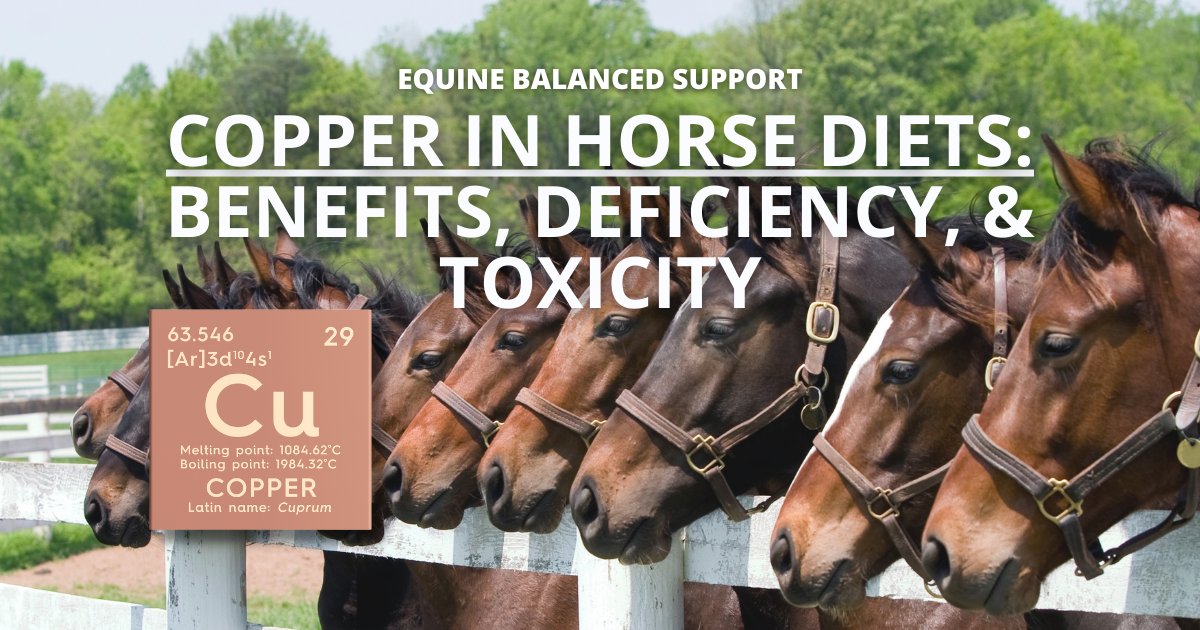Copper in Horse Diets: What Does it Do? Understanding Copper Deficiency & Toxicity

Why Copper is the Key to Your Horse’s Vitality and Performance
The Vital Role of Copper in Equine Health: Everything Horse Owners Need to Know
Is your horse missing out on a vital mineral for peak health? Discover how copper could be the game-changer in your horse’s diet!
Copper is a trace mineral essential for maintaining horses' health and performance. Its importance goes beyond individual functions, as it interacts with other nutrients to support various physiological processes. Read on to explore the role of copper in equine health, its functions, potential deficiencies and toxicities, test methods to determine copper levels, and actionable tips to manage copper intake.
What Does Copper Do for Horses?
Copper plays a crucial role in several physiological functions in horses, including:
- Enzyme Activation: Copper is a cofactor for many enzymes necessary for numerous biochemical reactions, including energy production, antioxidant defense, and collagen and elastin formation (Suttle, 2010).
- Connective Tissue Health: Copper is vital for synthesizing collagen and elastin, essential components of connective tissues such as tendons, ligaments, and cartilage, supporting joint and tendon health (NRC, 2007).
- Red Blood Cell Formation: Copper is involved in iron metabolism and hemoglobin formation, necessary for oxygen transport in the blood (NRC, 2007).
- Immune Function: Copper supports a healthy immune system, helping protect against infections (Geor et al., 2013).
- Pigmentation: Copper is essential for melanin production, influencing hair and coat color (Suttle, 2010).
What are the Signs of Copper Deficiency in Horses?
Copper deficiency can lead to various health issues, including:
- Developmental Orthopedic Disease (DOD): A condition common in young horses, leading to bone and joint development issues.
- Anemia: Caused by impaired iron metabolism and red blood cell formation.
- Poor Coat Condition: Resulting in a dull, rough coat and loss of hair pigment.
- Weakened Immune System: Increased susceptibility to infections (NRC, 2007; Geor et al., 2013).
What Happens if a Horse Has Too Much Copper?
Yes, excessive copper intake can lead to toxicity, causing liver damage and other health problems. It is crucial to balance copper intake through a well-formulated diet (NRC, 2007).
How Does Copper Interact with Other Nutrients?
Copper interacts with several other nutrients, impacting its effectiveness and metabolism:
- Zinc: Competes with copper for absorption. An imbalance can inhibit copper absorption, leading to deficiency. The recommended zinc-to-copper ratio is typically around 3:1 to 5:1 (Suttle, 2010).
- Iron: High dietary iron can interfere with copper absorption, especially if the horse consumes iron-rich water or lives on iron-rich soil (NRC, 2007).
- Molybdenum: Forms complexes with copper, reducing its bioavailability. High molybdenum levels can exacerbate copper deficiency (Geor et al., 2013).
- Sulfur: Sulfur-containing compounds can bind with copper, making it less available for absorption (Suttle, 2010).
How Can You Test Copper Levels in Horses?
Testing is key to understanding copper levels in horses. Here are common methods:
- Blood Tests: Standard for measuring serum copper levels. Blood tests indicate whether a horse has adequate copper levels. A veterinarian should conduct these for routine monitoring or investigating suspected deficiencies.
- Liver Biopsy: This invasive procedure directly measures copper stores, as the liver is the primary site for copper storage. It’s used when precise measurement is critical.
- Hair Mineral Analysis: A noninvasive option that evaluates copper levels over time by analyzing a sample of the horse’s mane hair. It offers insights into long-term mineral status.
- Forage and Feed Analysis: Send forage samples to a lab for mineral analysis, which can help balance a horse’s diet.
Signs of Copper Imbalance
Copper Deficiency Symptoms
- Joint and Bone Issues: Developmental orthopedic disease (DOD) in young horses, joint stiffness, and poor bone formation.
- Anemia: Symptoms include weakness, fatigue, and poor exercise tolerance.
- Coat and Skin Problems: Dull coat, hair loss, and loss of pigmentation.
- Immune Deficiency: Increased susceptibility to infections and slow wound healing.
Copper Toxicity Symptoms
- Liver Damage: Symptoms include jaundice, lethargy, and poor appetite.
- Gastrointestinal Distress: Symptoms include colic and diarrhea.
- Neurological Issues: Symptoms include unsteady gait and muscle tremors.
Managing Copper Intake in Horses
Ensure that your horse receives balanced copper intake by following these steps:
- Ensure a Balanced Diet: High-quality forage and commercial feeds typically provide adequate copper. Choose products based on your horse's age, workload, and health status.
- Regular Testing and Supplementation: Conduct blood tests, liver biopsies, or hair mineral analyses as recommended by your veterinarian. Supplement with copper cautiously and under professional guidance to avoid toxicity.
- Manage Nutrient Interactions: Maintain proper zinc-to-copper and iron-to-copper ratios and monitor molybdenum and sulfur levels, adjusting copper intake as necessary.
Additional Benefits of Copper in Equine Health
- Anti-Inflammatory Benefits: Copper supports superoxide dismutase, an enzyme with anti-inflammatory properties, helping horses with inflammatory conditions.
- Impact on Reproduction: Adequate copper levels are crucial for reproductive health in mares and stallions, affecting fertility and fetal development.
- Role in Bone Health: Copper is essential for strong bones by supporting collagen and elastin formation, reducing fracture risk.
Common Questions About Copper in Horses
- How Can I Tell if My Horse Needs More Copper? Signs include poor coat condition, anemia, and orthopedic issues. If suspected, consult a veterinarian for testing and dietary adjustments.
- Are There Natural Sources of Copper I Can Include in My Horse's Diet? Yes, forage and hay often contain copper, but levels vary based on soil quality. Commercial feeds are often fortified with copper.
- How Does Copper Deficiency Affect Young Horses? Young horses need sufficient copper for healthy bone and joint development, with deficiency potentially leading to developmental orthopedic disease.
Conclusion
Copper is an essential trace mineral that supports numerous physiological processes in horses, from enzyme activation and connective tissue health to immune function and pigmentation. Understanding its role and maintaining a balanced intake through diet and supplements, when necessary, is critical to ensuring your horse's health and performance.
Ready to take the next step to provide the best care for your horse? Click here to order a Hair Mineral Analysis Kit!





Leave a comment